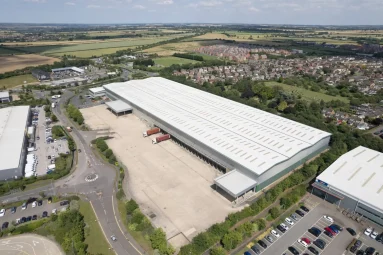
6 Business and Social Trends Reshaping the Supply Chain
The supply chain landscape is changing. Discover the six business and social trends responsible and what they could mean for your logistics operations.
It’s only to be expected that an industry built on moving goods and services should also have to shift as technology and consumer tastes reshape the economic landscape. As revealed by industry reports, here are the six most important business and social trends currently driving change across the supply chain horizon.
1. The uptake of automation and robotics
‘Declining birthrates and the trend toward ageing in many advanced and some emerging economies mean that peak employment will occur in most countries within 50 years’, McKinsey reports. ‘The expected decline in the share of the working-age population will open an economic growth gap. Even at historical rates of productivity growth, economic growth could be nearly halved.’
Collaborative technology could support ageing workforces in manual handling activities, and logistics processes will be accelerated by the deployment of machines.
For operators concerned with productivity, the benefits will be improved efficiency, lower costs, quicker fulfilment times, and a source of mechanised labour at times when workforces shrink. Employees must become more skilled, have greater responsibilities, and benefit from the enhanced training opportunities necessary to support this. On-demand workforce concepts will also give them more scheduling flexibility.
2. Increasing connectedness between consumer and supplier
Mobile, wearable, and smart home technologies are binding consumers with each other and their surroundings in ways that can help optimise logistics services.
The consumer preference and activity data that such devices generate will lead to improved transparency, traceability, and reliability of delivery and pickup services, with missed drop-offs or collections minimised through secure home — or secure vehicle — delivery access.
Internet of things (IoT) connections will revolutionise replenishment procedures as home fridges or restaurant freezers automatically reorder stocks as they run low. By 2020, Gartner predicts that 50% of everyday essential products will be replenished through IoT. And integration with voice-activated devices offers access to logistics data for homes and businesses, especially for tech-wary older consumers.
By 2020, Gartner predicts that 50% of everyday essential products will be replenished through IoT
The slow speed of adoption and the multitude of different digital standards and APIs may initially hamper developments, but the long-term efficiencies they offer those logistics providers willing to engage these technologies are inarguable.
3. Growing consumer expectations around responsible logistics
A 2017 Unilever report reveals that up to a third of consumers now prefer sustainable brands. As consumers are increasingly demanding services that are environmentally and socially sustainable, and while that places added responsibilities on logistics providers, it needn’t be at the expense of competitiveness.
A third of consumers now prefer sustainable brands While it may be difficult to define exactly what constitutes ‘fair’ and ‘responsible’ practices, striving to execute each part of the supply chain with those characteristics in mind is expected to open new opportunities and add value to what providers already do.
Imaginative solutions to meet the expectations of the EU’s intended ban on plastic packaging and its hopes to create a circular economy are already being put into action. This has been seen in the integration of recycling efforts with delivery and pickup services, and it is envisaged that innovations will extend such initiatives into other parts of the supply chain.
4. Digital brokerage platforms transforming logistics services
Tailored services are entering the logistics space through digital brokerage platforms that match buyers with providers.
According to research by Deloitte, ‘in Singapore, FreshTurf is building an open platform based on blockchain technology that allows customers and carriers to trace a package all the way from shipment to smart locker.’
While it is hard to imagine the complexities of freight forwarding being overcome in this way, it is anticipated that most stages of a supply chain will be catered for across multiple modes via cloud-based freight marketplaces.
In Singapore, FreshTurf is building an open platform based on blockchain technology that allows customers and carriers to trace a package all the way from shipment to smart locker.
Similarly, the application of an Airbnb-style business model to warehousing can add flexibility to on-demand storage models. Companies that sell products on Amazon can already use Fulfillment by Amazon (FBA) to fulfill those orders. As FBA explains it, ‘You send your products to Amazon fulfillment centers, and we pick, pack, and ship them and provide customer service.’
It is also likely that companies will use such digital meeting places to bid to provide same day — or even same hour — deliveries over the last mile.
Security, insurance, and ensuring logistics capacity may hinder rapid development in this space, but the benefits of real-time-quoting, flexibility in service sourcing, and capacity optimisation are clear.
5. Personalisation and convenience driving omnichannel logistics
As CMO reports, ‘Consumers have rising demands and a new understanding of speed, brand relationship and personalisation’. This looks like ‘anytime, anywhere, from any device’ flexibility, and it means faster online and offline fulfilment is essential.
Logistics providers will have to devise an intelligent and varied mix of physical and online assets to bring down order and delivery times and to build and streamline returns processes. That may encourage shops to become last mile fulfilment centres or warehouses to convert space into showrooms, in the style of IKEA. Either way, multi-channel services can be the source of opportunities along supply chains.
Consumers have rising demands and a new understanding of speed, brand relationship and personalisation.
Investment needed to mix the channels will be sizeable, especially in updating the IT and artificial intelligence software needed to manage the flow of data between the physical and online ecosystems. But that will be recouped as the flexibility of such arrangements offer leads to better capacity utilisation and the flattening of peaks and troughs in demand.
6. The growing servitisation of manufacturers
Managers are rethinking their supply chains as manufacturers shift from merely making things to providing services that require those goods. In a servitised world, satisfying outcomes become the products. A Rolls-Royce jet engine, for instance, is no longer the final delivered product under the company’s Power-by-the-House model: keeping those engines running is, and so Rolls-Royce offers full servicing and maintenance as well as value added services.
Providing those outcomes means managing the performance of goods through their lifetimes. Bringing supply chains closer to manufacturers to enable faster and more responsive replenishment and replacements will become key to achieving that. A breakdown in the supply chain can be disastrous, so added resilience needs to be built into those processes.
For an industry built on moving goods and services, implementing change across traditionally rigid and often complex supply chains can be costly and time-consuming in the short term. But supply chain directors looking to the future will doubtless recognise the necessity of adapting in order to remain competitive and deliver the supply chain service expected by today’s increasingly discerning consumers. The long-term financial benefits of such actions will amount to more than a little change.
More in Manufacturing

Intertronics: Driving Innovation in Adhesives and Assembly Solutions
For over four decades, Intertronics has been at the forefront of providing high-performance adhesives, coatings, sealants, and application equipment to industries that demand precision and reliability. From electronics and medical devices to automotive and aerospace, Intertronics’ expertise ensures that manufacturers can optimise their bonding and assembly processes with cutting-edge solutions.

Unipart named CCS supplier
Unipart has been named as a supplier on Crown Commercial Service’s (CCS) Logistics, Warehousing and Supply Chain Solutions (RM6329) framework agreement.

Owen Mumford: 70 Years of Innovation in Healthcare
Owen Mumford has been at the forefront of medical device innovation for over 70 years, pioneering solutions that enhance patient care and improve healthcare outcomes worldwide. Established in 1952 by Ivan Owen and John Mumford, the company has grown into a global leader in medical device design and manufacturing, with a commitment to quality, sustainability, and patient-centred innovation.
From this author

Unipart named CCS supplier
Unipart has been named as a supplier on Crown Commercial Service’s (CCS) Logistics, Warehousing and Supply Chain Solutions (RM6329) framework agreement.

Unipart partners GBUK
Unipart has formed a strategic partnership with GBUK

Unipart launches in Vietnam
Unipart, the supply chain performance improvement partner, has launched operations in Vietnam.

